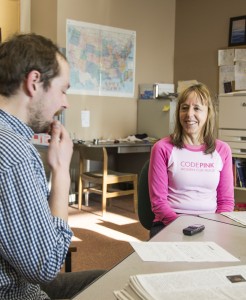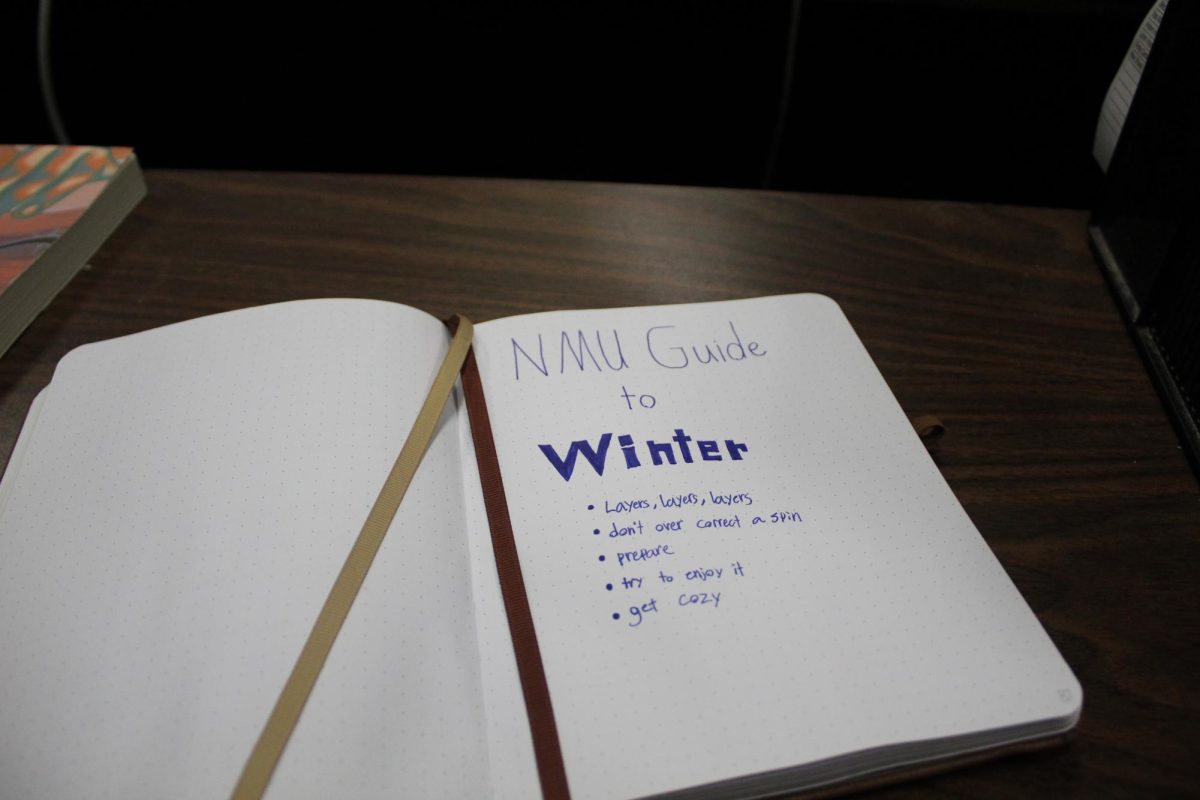Medea Benjamin, co-founder of Global Exchange and CODEPINK: Women for Peace, is the author of “Drone Warfare: Killing by Remote Control.” She spoke at NMU on Tuesday, April 1. The North Wind’s opinion editor Michael Williams sat down with Benjamin to talk issues.
NW: Why do trade and peace issues intersect for you? Based on your activism, it seems that they do.
MB: They connect in terms of justice issues. If you look at trade, you see big time winners and losers. Big corporations that make huge amounts of money oftentimes exploiting people who are already very poor. And when you look at war you have the same dynamic. Who wins from these wars? Big corporations that sell weapons or are major contractors to the Pentagon. Who are the losers? Well, there are the real losers, people who are dead. And those tend to be not just U.S. soldiers but people in the countries that we are invading, like Iraq, where we have no idea how many people we’ve killed, over 100,000. And then most of us are the losers because of the huge amount of resources that we pour into wars that have not benefited local people or made us safer here at home. So I think it’s really about fairness and trying to move our world toward one that’s more just.
NW: In the coming two decades, what kind of progress we could see on that kind of front?
MB: On the war and peace front, people often say ‘Well, drones are progress, because we’re killing fewer innocent people.’ Sure, if you’re comparing it to World War II when we carpet bombed places and huge numbers of people were killed. But civilization is supposed to progress to where we aren’t making war anymore rather than finding newer, cooler, more high-tech ways of killing people. Drones are just another progression toward war, they are not a progression toward peace. And now there are new weapons to shoot down the drones and then there’s fancier drones that are harder to shoot down and then we’ll have to make fancier weapons to shoot them down. So it’s really part of this endless cycle of war. And if we’re looking towards where we wanna go in the coming decades, we should be looking to go to a place beyond war. That’s why we shouldn’t allow people to pose it as ‘boots on the ground’ versus ‘drones,’ we should say ‘that’s all part of the same package.’
NW: Why do you think the Obama administration has been disappointing for progressives?
MB: I think a lot of progs put our hopes and desires onto Obama without really looking closely at what his positions are. Yes, he said he was going to get us out of the war in Iraq, but [President] George Bush had already signed the agreement forced on us by the Iraqi gov that our troops were going to leave. That was a done deal. Then [Obama] said that Afghanistan was the good war, and sure enough he added tens of thousands of more troops to Afghanistan. He was really a centrist to begin with, but a lot of us were so desperate to get rid of George Bush that we put a lot more onto him that he was going to be the ‘peace president.’ He did campaign that he was going to close Guantanamo [Bay Prison], which he never did. In general, what the real problem was is that we were so relieved to have somebody other than Bush in power, we were so excited that it was the first black president that we didn’t want to protest under Obama. The peace movement just dissolved, thinking ‘Okay, Obama’s going to lead us into this new foreign policy based on negotiations and not war,’ and on top of that the financial crunch just made people look inward. Add one more factor that a lot of the people involved in the anti-war movement under Bush really just ended up being interested in partisan politics than they were in the moral issues. So if a movement falls apart and doesn’t push the president, who’s he gonna listen to? He’s going to listen to the Pentagon, he’s going to listen to the CIA. In many ways, if you want to put the fault somewhere, you have to put it on the fact that we weren’t able to sustain the kind of movement we had under the Bush administration. We didn’t push Obama enough.
NW: How do you think that movement can be rebuilt?
MB: I’m really worried that the next president is going to be Hillary Clinton and all of these women in the peace movement are going to say ‘Wait a minute! It was hard enough to protest under a black president, but a woman!” It’s not going to be easy. She is a war hawk. We’ve started to rebuild it in a very interesting way in just the last year. That is not through getting out large numbers of people in the streets. We can’t do that, like under the Bush years. It’s been in this very strange bedfellow coalition that’s come together. If you look at how we stopped President Obama from taking us into a war in Syria, it was through libertarians, people on the extreme right of the Republican party, it’s people to the left of the Democratic party, it’s independents, it’s Greens who came together and said, ‘I think we need another war like we need a hole in the head. We’re going to stop this.’ And we forced, for a very rare moment, Congress to actually listen to us. They’re usually just rubberstamping either what the president says or new military involvement because they want to look tough. I was in Congress at that time. We set up an encampment, we called it the “Peace Insurrection’ outside Congress. When we went in [Congressional] offices, we realized they were getting calls from left, right, center, from people saying ‘No’ and they listened. We’re rebuilding a peace movement that looks very different from the peace movement that we had under the Bush Administration. And it’s not in the streets.
NW: You’ve run under a Green [Party] ticket. Do you think there’s hope for alternative parties in the future?
MB: I think the system is still so rigged towards the two parties that it’s still really hard to break out of that. So much of that is institutional. Every single state has different criteria for getting on the ballot and some of them are very difficult. How do you get into the debates? The debates are such a determining factor whether the public is going to hear your point of view. And if the people running those debates say, “Sorry, this is just for Democrats and Republicans and maybe a billionaire who might want to run as an independent,’ how are you going to break into that. And just the huge amount of corruption of money in politics that’s getting worse. There’s a Supreme Court case that’s about to be decided going to make it worse than Citizens United. It’s unfortunate that the political system is so difficult for third parties to break into that we’re gonna have to do this [less] through party politics.
NW: How?
MB: I think that there are movements that are building up to tipping points. Some of us thought that it was going to be the Occupy Movement, it wasn’t quite there yet. On the environmental front, there’s a lot of young people who are seeing that there might not be a planet for them to inherit. They are getting so concerned that they are engaging in civil disobedience, stepping up their level of activism. I think there are a lot more connections between movements than there were in the past. It’s not so much our silos of here’s the peace movement, here’s the environmental movement, here’s the immigrant rights movement, but people seeing them as social justice movements that connect to each other. And I think that many of us have learned a lesson under Obama to not pin your hopes on a particular person or a particular party. Movements have to be separated from party politics and they might work with party politics because you have to to get laws passed and policies changed on that level. But that’s very different from being tied to an electoral system. It’s not going to be through the two major political parties that we’re going to see the kind of change we want to see in this country.
NW: Maybe it will help people redefine civic engagement and not just think of it as voting every four years and working on a campaign.
MB: That’s right. And civic engagement is much more intense than that. And it is much more rewarding than that. Because it is very depressing if you’ve thrown your life into somebody getting elected and then you see them being pulled in the opposite direction by the forces of the position in power. And realizing that big money does talk, not just on election day, but every single day. Where is that countervailing voice? Well, it’s not there if we’re only organizing around elections. But it has to be there every single day.
NW: What drew you to the issue of drones amongst a
MB: Well, I’d like to see us evolving as a civilization to go beyond war. And yet, what I saw, was us evolving beyond getting our troops involved in risk. If we continue making war from the safety of our air conditioned Air Force bases and ergonomic chairs and not putting lives of our soldiers at risk, well cool, let’s keep making war. But what that really means is to keep making money for the military-industrial complex and keep killing a lot of poor people of color in other countries. Also, I realized because somebody hit me over the head by telling me this in Yemen saying, ‘You’re perfecting this technology of killing by remote control on us poor countries, people that you who you think are indispensable. But this is going to come back to haunt you in the United States.’ It’s true, the lobby of the drone industry is so strong that they forced legislation through Congress saying that our own air space is going to be opened up by the end of 2015. You already see police departments buying those drones, the FBI having them, border patrol having them and it’s not only a great concern for an over-surveilled society already to have this new way of watching us 24 hours a day seven days a week, but also drones that are designed to be weaponized. I don’t find it comforting when I was in a hearing and the director of the FBI was asked, ‘Can drones be used to kill people in the United States?’ and he said, ‘I don’t know, I’ll have to get back to you on that one.’ We should be worried about this technology and we should be worried about government secrecy. We have to thank Edward Snowden and the whistleblowers for exposing some of the things our government has been doing. We have to recognize that drone warfare has been done in secret. And it’s only by groups coming out and demanding information from our government, protesting at bases, going to jail that we’ve been able to remove some of the levels of secrecy. Not enough, but we’ve seen that this type of activism works. If we do it more, I think we’ll be able to expose our government’s policies more. And that’s the first step toward changing it.
NW: As far as secrecy, do you think we’ve only seen the tip of the iceberg?
MB: According to people like Edward Snowden, there’s a lot more to come in terms of information he has that’s going to be released. So I think yes, it’s the tip of the iceberg, There’s other things, for example, there’s a torture report that the Senate Intelligence Committee has been working on for years now of what was done during the Bush administration in terms of U.S. use of torture, in terms of extraordinary rendition, indefinite detention and that there’s a real struggle now to release that report and if we get it released with enough information, it’s going to be redacted big time, but if we get enough of it released and start demanding some accountability. Obama said ‘We’re going to look forward and not backward’ and that was wrong because we have to look backward and part of that is [acquiring] the information about what our gov did in our name. We want some accounting of who did it. Shouldn’t they be brought to task for the way they not only violated individuals but they have violated what are supposed to be basic precepts of what a democratic society is all about. I think on drone warfare, we’re going to be demanding everything from the legal memos that justified use of drones to demanding to see the information about who has been killed. If we’re successful in getting that information, I think we’re going to shock a lot of Americans about what our government has been doing.
NW: Do you think that the military draw down is related to drone technology?
MB: I think it is. The military understands that they can keep these wars going in ways that keep our troops safe, in ways that have some savings to them. That’s why drone technology has become such a favorite of the Obama administration as well as cyber warfare and special operations. I think we will be seeing a shift in the way we wage wars in the future, but it’s still going to be warfare. It still hasn’t led us to the evolution that I think we need to see.
NW: Sen. Carl Levin was here a few weeks ago and I was able to catch him in a press conference. I asked him if there was any Senate oversight planned for drone wars and he used about 200 words to say, ‘I don’t know.’ Do you see any hope within the federal government to responding to this kind of executive latitude?
MB: First we have to recognize that our Congress has done a miserable job in terms of oversight. You look at the Intelligence Committee, the head of it is Diane Feinstein and she was saying that the NSA was doing a wonderful job, until she was spied on. You look at the oversight of the drone program and she, as well as Carl Levin, on the Armed Services [Committee] saying that just a handful of innocent people have been killed. I heard that Levin on campus admitted that it’s very hard to tell a militant from a civilian. He has allowed our government to go on with this myth that we are killing militants and not civilians. He’s a quote, ‘nice guy,’ and Obama seems like a nice guy, but they’re killing a lot of innocent people. Levin is not doing the type of oversight he should be doing. We’ve gone to his office many times, his staff is very nice, they’re good at deflectingg. They’re very liberal in the way they sound. But they don’t do their job. They haven’t done their job in terms of oversight. If you look back in the day at how Congress stepped in when the CIA getting out of control, you look for that today and you’re just not finding it. The only opening we see is Dianne Feinstein being very upset at the way she’s been spied on and this might spur her to more action. But isn’t that pretty pathetic?
NW: Do you think it would have been different if the NSA scandal broke under a Romney Administration instead of Obama?
MB: Sure. Or if it had broken under George Bush. Just like the issue of drones. I’m convinced we would have stopped drone warfare in places like Pakistan, Yemen, Somalia if it had been under a Republican president. Because then we would have seen the largest caucus in Congress, the Progressive Caucus, coming out saying ‘This violates Constitutional law!’ Now they have been pretty much silent. Every once in a while they come out and say, ‘Oh, we should have a little more transparency.’ But were it under a Republican, they would be yelling and shouting and the program would have stopped. The NSA and the collection of metadata would have stopped. It’s been glacier-like slow because it’s happening under a Democratic administration.
NW: So do we vote Republican?
MB: I’ve gone beyond encouraging people to vote one way or the other. It’s really an individual decision about how people want to vote. I think the important thing is telling them that that vote is one thing they do once every four years. What is it they’ve done every day leading up to that [election]? I vote for third party alternatives most of the time. I believe in third parties. I think we would have a more dynamic system.
NW: What advice do you give to young activists?
MB: I don’t want to paint such a negative picture. People need to be motivated from a positive place. Sometimes I go and see speakers say ‘The world is coming to an end,’ and I’m like ‘Alright, I’m just going to go home and get high.’ So, I do have a positive attitude. I’ve seen so many things change in my lifetime and I see changes happening so quickly now. Like the change in acceptance toward same-sex marriage, it’s been remarkably quick. The change toward legalization of drugs is happening quite quickly. A lot of people changing their minds toward issues around climate chaos, that it’s real, that it’s human made, that’s happening quite quickly. I think there is a rapid period of change right now. Look at the immigration issue, just ten years ago, people would be saying ‘Look at these damn immigrants who are taking our jobs.’ Certainly there are still people saying that, but less and less. Transformation is happening quite quickly. I think that should give young people hope. With drones, it’s very hard to move against these big issues and come up against the huge military industry that’s entrenched, but I see that we’ve already made a big difference in two years. We have forced an administration to talk about a program they said was too covert to even mention. We’ve forced them to reduce the number of drone strikes, to try to kill less innocent people when they do it. And I think we’re forcing a discussion at the international level. That’s pretty rapid change. And change in the polls of people’s support for drones has dropped about 20% in the last year. That’s big change. So I think people should take heart that while we may not see the kind of changes we want, as quickly as we want, we are seeing change happening. It’s coming from the bottom-up. No matter which movement somebody decides to get involved in, whether is the LGBT movement, the immigrant rights movement, the environmental movement, it’s important to realize that these are connected and are part of an evolution to a more just and sustainable society. And to realize that these are lifetime commitments that we make. If you don’t see change in one or two years, keep at it and you will see it if you keep at it long enough.
NW: Do you think activism is a dangerous activity?
MB: On the one hand it’s really dangerous to not be active. We could get involved in World War III, we could see an end to life on the planet if we don’t get involved. If you do get active and you are effective, yes, it can be dangerous. I was just beat up in Egypt for wanting to take a group of peaceful women to Gaza. I’ve been kidnapped at gunpoint in Pakistan for supporting a democratic movement. Tear gassed and deported from Bahrain for supporting the Arab Spring. If you put yourself in certain situations it can be dangerous. You can also certainly become the target of investigation by your own government and that has happened. Look at Martin Luther King. Yes, it can be, but I would say that the dangers of not being active are greater than the dangers of being active.
NW: If there was one issue that you would like see Obama address, what would that be for you?
MB: Well, I think the issue of wealth inequality is one of the major issues that affects life in this country, but that’s long term transformation. He has said that he wants to see an increase in the minimum wage and he finally did it for federal workers, which he could have done the day he got into office, but he’s done it. That’s good. I think taking on this issue of government secrecy would be a good issue. He said he was going to be the most transparent president and he’s been one of the most secretive president. I think letting information getting out to the American public before he left would be a good thing to do. I think it would be absolutely wonderful if he would extend a pardon to Edward Snowden, Chelsea Manning, who is now sentenced to decades in prison and to John Kiriakou who is in prison for exposing torture in the CIA, that would be a wonderful gesture, to recognize how important whistleblowers have been. His administration, which has been the one that has gone after more whistleblowers than any administration, to right that wrong before he left office would be a very important signal.
NW: Surprising too.
MB: Yes, I don’t think it’s going to happen, unfortunately. But we can keep hope alive.
Can I say one more thing? I never say one issue is more important than the other, because they are so connected, but one thing that does worry me is that the peace movement that does exist in this country today is mostly a movement of older people. And that’s really dangerous. The only way we’re going to stop this massive drain of resources into our military that is one of the reasons why college education is not affordable, why we can’t have a single payer healthcare system for everybody, why we are not moving forward on fast trains and good infrastructure and public transportation is because we spend 57% of our discretionary funds on the military. We do need young people who understand how much the bloated military is holding us back as a society. And to get involved in the movement to shift our resources away from the military into life-affirming activities, into green jobs, into sustainable economy. That’s one plea I’d like to put out to young people. To not leave us old folks from the Vietnam Era holding the banner.




























